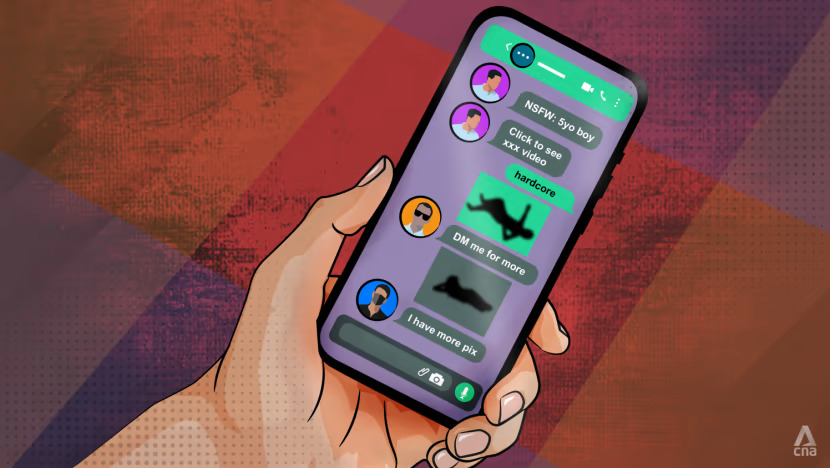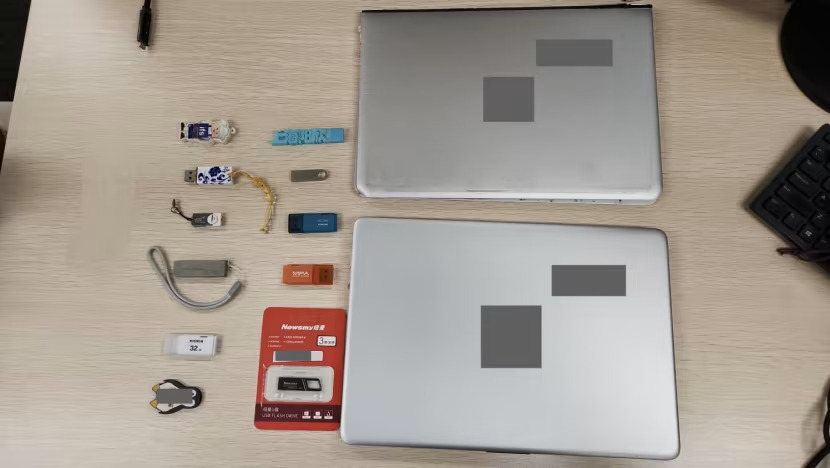News
Child Porn: Sex Addiction Rises & How Is Singapore Dealing With It?

Child Porn – Wong Ket Kok engaged in a filthy daily habit for five years, downloading images and videos of young children being sexually abused—some of whom were not much older than his own children.
Approximately 47,000 files depicting children in sexual acts or poses were discovered on his hard drives and laptop when he was arrested.
Boris Kunsevitsky, an Australian paedophile who preyed on five children in Singapore, made reams of tapes and photographs of himself sexually abusing youngsters in another case that rocked the area.
Investigators discovered a “Jailbait” folder on his computer, which had images and recordings of him engaging in sexual activity with minors in his Singapore home.
Such incidents have garnered more and more attention in recent years, both internationally and in Singapore. In Singapore, specific legislation against internet child sex abuse content went into effect at the beginning of 2020.
“Every single clip or image of child sexual abuse material represents an actual child being sexually violated,” said Deputy Public Prosecutor Chong Kee En, who specialises in prosecuting sex crimes.
Some of the children in the clip are drugged or even tortured, and none of them are capable of giving meaningful consent.
“Even offenders who were not involved in the creation of such material must take responsibility because they increase the demand for such material, which encourages the exploitation of children and sexual assault in the future.”
The so-called marketplace for these images and films, which have spread from the dark web to well-known messaging apps like Telegram, is examined by CNA along with how the government is addressing the sinister problem.
Sexual Grooming, Regular Uploads
According to Mr. Thomas Muller, director of network development at ECPAT International, one method offenders get access to child sexual abuse networks is by routinely creating and uploading fresh content, which becomes their “membership criteria”.
A network of civil society organizations called ECPAT strives to prevent the sexual exploitation of children on a global scale.
“(The abuse networks) are quite specific about (what they want) — for example, they’re not looking for material depicting those older than 15, or something like that,” said Mr. Muller, who is located in Bangkok.
The group will be rebuilt somewhere if someone leaves because they are suspected of being law enforcement if they do not regularly contribute material containing child sexual assault.
“No country, no region is safe,” said Mr. Muller. This occurs on a worldwide scale, with perpetrators in Singapore connected to those outside through the internet.
Mr. Muller cited the rise in images and films created by children and teenagers as evidence that criminals may no longer even be responsible for the content.
Victims may be forced or instructed to record the abuse using webcams or mobile phones.
According to the Internet Watch Foundation (IWF), a UK-based child safety nonprofit, such material was mentioned in 4/5 of online child sexual abuse allegations received in 2018 — a 9% rise from 2021.
Sexual grooming of a minor under 16 is illegal in Singapore. Offenders also “groom” a child, which involves developing a relationship with the goal of pressuring a child or young person into sexual action or into sharing sexual material.
More fuel has been added to the fire by the rising popularity of online gaming platforms like Discord and Roblox, which combine chat group features with the actual games.
According to Mr. Muller, it is increasingly common for children to grow up and have their first sexual encounter through online relationships, online dating, and the trusting exchange of private information.
Then, that trust is violated, causing these images to be leaked and shared without their permission.
Sex Addiction

The prosecution, Mr. Chong, stated that many criminals first see adult pornography and do not intentionally look for images or videos of children being sexually abused, but after being exposed to it for a while, they “become desensitised and even addicted” to it.
Others may not be aware that they have broken the law when they download or receive adult pornographic material that contains significant amounts of child sex abuse.
“Even if they knew or should have reasonably known that the material they owned contained evidence of child sexual abuse, this is still an offence. This is true even if they didn’t actively watch the clips they had, according to Mr. Chong.
“Each time a clip is traded, it inflicts new harm and victimises the child, who is being objectified by countless viewers all over the world,” the statement reads.
The sexual assault unit of the Singapore Prison Service (SPS), which is a part of its psychological and custodial rehabilitation division, added that those who watch child sexual abuse material may go beyond that to commit “contact sexual offenses.”
According to the statement, “they are more likely to engage in such acts due to the significant time spent online viewing or collecting materials and dependence on these materials for sexual arousal.”
“The accessibility offered by the internet may also enable the offender to grow his network with other people online who share his interests.
In addition to giving them access to potential victims, “these forums facilitate their exchange of deviant thoughts, which normalises their deviant online behaviors and sexual interest in children, and may increase their risk of sexual reoffending.”
The jail system also noted that not every offender who views such materials will engage in “contact sexual offences” involving children.
According to the prison service, seeing videos of child sexual assault can skew one’s perception or change their ideas about what constitutes appropriate kid contact.
And these offenders’ skewed attitudes might encourage them to continue engaging in such activities.
For instance, some adults may argue that they restrict their involvement to merely watching content about child sexual abuse and refrain from having actual sexual contact with minors.
Or that they believe the children gave their agreement for their photographs to be taken and shared legally.
Additionally, frequent exposure to material that glorifies child sex exploitation may cause viewers to have lower barriers against engaging in child sex.
In addition to possibly having a sexual interest in youngsters, “the involvement in production or distribution of materials may also be motivated by a financial gain.”
Encryption: A Problem in Burglary
While those who deal in such material typically use the dark web, other venues have seen growth recently, including peer-to-peer (P2P) file-sharing programmes and encrypted chat groups on Telegram or WhatsApp.
Through peer-to-peer (P2P) file sharing, computer users can exchange resources directly with one another. One offender from Singapore downloaded such content using the 20-year-old programme eMule.
After beginning to view pornography on Telegram somewhere between 2013 and 2014, other offenders, including Ansari Abdul Amin, also used a cloud-based storage and file hosting service.
Videos featuring infants and kids younger than 11 were among the content he saw.
In order to facilitate trades with other persons, Ansari, who was detained by the police in 2021, removed redundant video files while keeping new ones.
A Sri Lankan man was imprisoned in Singapore in March for disseminating videos of child sexual abuse in a WhatsApp group he founded. The tapes, according to the prosecution, “scraped the very pits of depravity.”
Such instances demonstrate how illegal trading has migrated to such platforms, posing a problem that has alarmed law enforcement organisations.
According to Mr. Muller, it is the responsibility of the organisations that control these encrypted platforms to establish guidelines; social media providers do not actively search for such content and ensure that it is not shared on their platforms.
“WhatsApp, Facebook, TikTok, and other platforms have their own standards, and they’re also overburdened,” he continued.
Governments need to step up and organise platform regulations so the rules of the game are the same for all of them, which is what we’re really pushing for right now.
I think we’re hearing from the companies more and more about how they want to see government regulation because they now realise they’re connected to everything bad in the world.
Case Facts
Investigators can consult global databases and collaborate with their peers in other countries when cases do come to the attention of the authorities.
Since the implementation of specific laws on January 1, 2020, the Singapore Police Force (SPF) reported that it has looked into 96 such cases.
Police personnel are “equipped with knowledge and skills” to look into situations involving child sexual abuse material, the spokeswoman continued.
They made no mention of the training procedure or the circumstances surrounding the five-week operation that resulted in the arrest of 23 men and targeted online child sex exploitation activities.
“SPF conducts operations targeting online child sexual exploitation activities, including the possession and distribution of child sexual abuse materials.
And will continue to take tough enforcement action against these illegal activities,” the spokesperson said.
Mr. Muller claimed that when law enforcement officers perform raids and seize technology like laptops and mobile phones, they take over administrative roles in these networks to weed out more offenders.
This allows them to infiltrate encrypted networks that transmit child sex abuse information.
Interpol’s International Child Sexual Exploitation (ICSE) database, which enables police officers to share information with law enforcement organisations abroad, is one weapon in SPF’s toolbox.
According to Mr. Uri Sadeh, coordinator of Interpol’s Crimes Against Children Unit, there has been “long-standing cooperation” between Interpol and SPF in the fight against online child sexual exploitation.
This cooperation was expanded in 2020 when SPF officers were given access to the database.
According to Mr. Sadeh, utilising image and video matching tools, expert investigators from more than 68 nations utilise the database to connect victims, abusers, and locations.
“By letting investigators know whether a series of images has already been discovered or identified in another country, or whether it has similar features to other images,” he said, “the database avoids duplication of effort and saves precious time.”
In the ICSE database, law enforcement officials from all over the world have so far located about 34,000 victims
Live Streaming

According to Ms. Bindu Sharma, managing director of the International Centre for Missing and Exploited Children (ICMEC) for Asia-Pacific, investigators can also identify perpetrators by looking at how they make payments.
A global non-governmental organisation (NGO), ICMEC maintains offices in Singapore and other nations in the area.
The Asia-Pacific Finance Coalition Against Child Sexual Exploitation, an initiative that was started in 2009 to combat the livestreaming, sale, and diffusion of child sexual abuse material, is headed by Ms. Sharma at the centre.
After the stream is stopped, livestreaming almost never leaves any traces of evidence, she said. Typically, offenders in these situations pay to watch victims being abused in real time.
Live broadcasting is entirely commercial, according to Ms. Sharma. “But the money is the main piece of proof here. The financial sector may now step up and say, “Here is some evidence we have.” This is where they can help.
“However, there must be… ability and willingness to collaborate closely with law enforcement groups.
But the emergence of secure payment methods, most notably digital currencies like Bitcoin, has also made it more challenging for law enforcement to find criminals.
“Particularly Distressing”
When the culprits are found and apprehended by the authorities, they face legal charges. The material must first be sorted through by detectives and prosecutors like Mr. Chong, with some cases including thousands of tapes.
It is especially upsetting when we can see or hear the youngsters in discomfort or pain, Mr. Chong told CNA, adding that many of us felt queasy when we saw such recordings because they showed young toddlers or newborns being hurt.
The sight of a young child attempting in vain to shield their face while being videotaped personally affects me the most since they are losing even this small amount of self-respect.
The youngsters seem to be in far-off nations, so there may also be sentiments of powerlessness.
The persons responsible for causing such heinous suffering may never be brought to justice, and these children may never be saved.
He has recommended his coworkers to review such material in the mornings so that the photographs “do not become the last thing we work on before going home for the day” and to take frequent breaks while doing so.
Nevertheless, he asserted that it was their duty to uphold objectivity and impartiality regardless of how serious the offence, and that they find it satisfying when they are able to successfully prosecute such cases.
The prosecutor claimed that since the specific rules went into force in 2020, the degree of an offender’s guilt has been “tiered” at each level.
Caning and penalties may also be enforced, as well as up to five years in prison for those who download, stream, access, or possess such films.
Offenders who are involved in the production of such material may also receive up to ten years in prison.
Before the new laws, such offenders could only be prosecuted for transmitting obscene material, which carried an imprisonment term of up to only three months and/or a fine.
Rehabilitation

After being found guilty, some offenders are sentenced to prison time and are enrolled in rehabilitation programmes.
According to the prison service, offenders will go through a psychological evaluation to determine their risk of reoffending and their needs for intervention.
These counselling sessions are intended to assist them in addressing issues with:
- Interpersonal relationships
- Self-regulation, such as difficulties in controlling inappropriate impulses or sexual urges
- Negative attitudes that support sexual offending
- Responsible use of the internet and other problematic online behaviours
- Using leisure time meaningfully
Inmates also participate in various rehabilitative activities like jobs, religious therapy, and family-based programmes after being guided to create personalised risk management plans.
If a psychologist determines it is required, they may also be directed to pertinent community organisations for additional counselling and support after their discharge.
Upon release, those who have been convicted of serious offences included in the First Schedule of the Prisons Act, which includes crimes involving child sexual abuse material.
Must submit to mandatory supervision and aftercare support, which includes electronic monitoring and curfews.
SPS stated: “Better protection of society is achieved with the Mandatory Aftercare Scheme through closer oversight… following their release, as well as improved aftercare support, like case management, to aid in their reintegration and lower their risk of reoffending.”
According to psychiatrist Christopher Cheok, he typically encounters such criminals during forensic assessments, which are procedures in which mental health professionals assess an accused person’s mental condition.
Dr. Cheok, the head of the forensic psychiatry division at the Institute of Mental Health, claimed that he has never personally encountered people who actively sought treatment for their interest in young children or for internet child abuse.
He stated that IMH can provide therapy to those who are troubled by their paedophilic tendencies that focuses on how they can control their conduct or stop viewing online images or videos of child sexual assault.
Dr. Cheok noted that if the patient consents, medicines to lessen their sex drive may also be provided.
Legal Changes
Although offenders are eventually brought to justice by the long arm of the law, legislation must also adapt to changing international trends.
The Penal Code of Singapore has undergone extensive changes that went into effect on January 1st, 2020. These changes include specific rules addressing the creation, distribution, advertising, and possession of child abuse materials.
Prior to this, only other offences connected to obscene films, which include all forms of pornography, could be used to convict offenders.
The review committee highlighted that the rules were not intended to “address the serious problems” that the internet has produced in terms of child sexual abuse content before the changes were passed. Livestreaming was another topic brought up by the committee.
In its 2018 report, the committee stated that even while there is no sexual penetration of the kid by the perpetrator in such circumstances, the psychological harm to the children who are exploited to participate in such acts is serious.
There are also extraterritorial regulations that target child sexual abuse content.
For instance, Singaporeans and permanent residents who utilise a kid to create child abuse content may face legal action if they do so abroad.
Governments all over the world have created or passed internet safety legislation in reaction to the spread of unlawful information on social media platforms.
The Online Criminal Harms Act is anticipated to be introduced in Singapore’s parliament later this year. If the Act is approved, it will give the government the authority to block or delete online statements that encourage crime offline.
The Infocomm Media Development Authority now has the authority to deal with any harmful online content that is available to Singapore consumers.
Regardless of where the content is hosted or originated, according to changes to the Broadcasting Act that were approved by parliament a few months ago.
Despite the encouraging steps Singapore has taken to combat online child sex material, advocates said that as more kids gain access to the internet, the world must be ready to deal with any new developments.
Getting governments, financial institutions, and banks to accept the problem was initially Ms. Sharma’s hardest obstacle, according to ICMEC.
As a result of media coverage, she continued, “there have been legal reviews and these kinds of public consultations that create awareness.”
“We must admit that humanity has a dark side on many fronts. People didn’t want to talk about this topic because it was so uncomfortable.





























